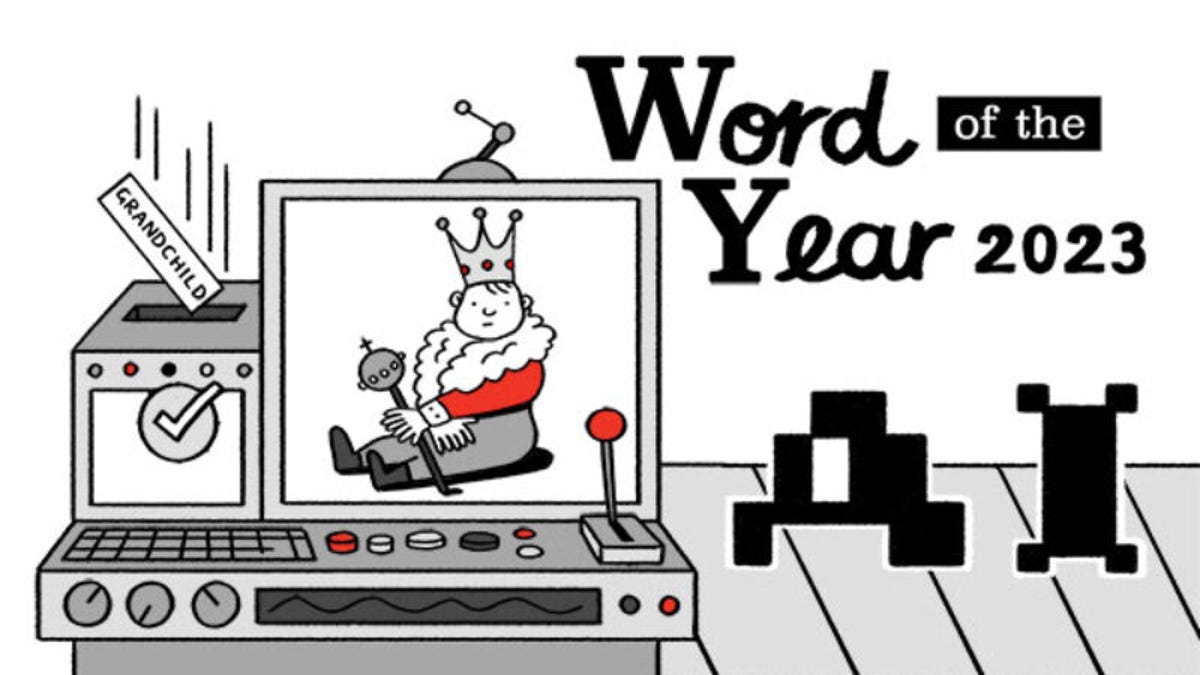
The Collins Dictionary word of the year is AI—the widely-used abbreviation for artificial intelligence.
“Considered to be the next great technological revolution, AI has seen rapid development and has been much talked about in 2023,” the UK dictionary, published by HarperCollins in Glasgow, announced in a blog post today (Nov. 1).
AI has become increasingly embedded in daily lives, from everyday use cases like email that predicts what you’ll say next and Instagram’s beauty filters to bigger phenomenons like healthcare diagnosis and self-driving cars. The tech has even been used to generate fake songs and write closing arguments for lawyers. The advent and upward climb of ChatGPT, with impressive natural speech capabilities, as well as generative image software like DALL-E, blurred the lines between humans and robots.
AI in itself is a hotly debated term, defined as “the modelling of human mental functions by computer programs” by Collins, and it is often the subject of debate. On one hand, the tech reduces human error and speeds up functions, but on the other, it’s viewed as an ethically-ambigious, job-stealing, and data-compromising engine.
The result of all the hype, good and bad, was “an explosion of debate, scrutiny, and prediction,” as per Collins. Usage of the term has apparently quadrupled this year, the BBC reported, citing the publisher.
Just this week, US president Joe Biden issued AI guidelines and vice president Kamala Harris announced the US AI Safety Institute, which will create “guidelines, tools, benchmarks, and best practices” to help mitigate risks from AI, according to a fact sheet. The world’s first AI safety summit starts today (Nov. 1) in the UK, with major economies like India, the US, France, and Singapore in attendance.
Other contenders for Collins’ word of the year for 2023
De-influencing: When social media influencers “warn followers to avoid certain commercial products, lifestyle choices, etc.”
Nepo baby: The label applied to someone “whose career is believed to have been advanced by having famous parents.”
Semaglutide: The active ingredient in type 2 diabetes drug Ozempic and weight-loss drug Wegovy, both of which are made by Danish pharmaceutical company Novo Nordisk, now one of the most valuable companies in Europe.
Canon event: Borrowed from literary studies, and a poke at the often too-restrictive demands of comic book fandom in this July’s hit film Spider-Man: Across the Spider-Verse (and, subsequently, a TikTok trend), the phrase has come to mean “an event that is essential to the formation of an individual’s character or identity,” as per Collins.
Ultra-processed: Foods “prepared using complex industrial methods, often using ingredients with little or no nutritional value.”
ULEZ: The acronym for “ultra-low emission zone,” where drivers incur a charge if they drive a polluting vehicle into the city. ULEZ expansion has been a political point of inflection this year.
Greedflation: When businesses use inflation as an excuse to hike prices to boost profit. Companies like PepsiCo and Nestle have been accused of it.
Debanking: Cutting people off from banking—a term largely in the news this year when populist UK politician Nigel Farage claimed his bank, Coutts, tried to close his account because of his political views.
Bazball: The “newly energetic (some say aggressive) form of the game named for England Test coach Brendon ‘Baz’ McCullum,” as defined by Collins.
Word of interest: NFT
AI is not the first tech abbreviation to be declared word of the year by Collins. In 2021, it was NFT (non-fungible tokens). That year, surrealist digital artist Beeple’s NFT of his piece Everydays: The First 5,000 Days—a collage of all the images he’d created since he committed in 2007 to making one every day—sold at Christie’s for a cool $69 million. He also sold another, Human One, for $28 million later that year.
Over the last year, though, these crypto assets appeared to have gone out of fashion., though experts say NFTs aren’t dead yet, just undergoing a market correction with prices cooling as challenges like authentication and preservation are solved.
One more thing: The Beatles are using AI to release their “last song”
Paul McCartney has used AI to help retrieve John Lennon’s vocals from an old demo cassette to create The Beatles’ “last song” Now and Then, which will be released tomorrow (Nov. 2). The track comes more than four decades after Lennon’s death (and nearly 30 years after their last last songs, “Free as a Bird” and “Real Love” were released, also from demo tapes of Lennon’s voice with new backing tracks).
“There it was, John’s voice, crystal clear. It’s quite emotional. And we all play on it, it’s a genuine Beatles recording,” Paul McCartney said.
No comments:
Post a Comment